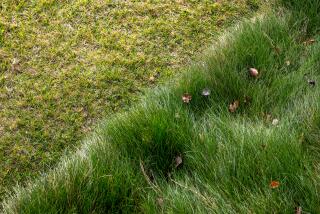Preventing Bermuda Grass From Spreading
- Share via
Question: How can I control the Bermuda grass that is invading my planter beds and tall fescue lawn?
D.V., Placentia
Answer: Bermuda grass can be a great turf grass for Southern California, but when it spreads into other areas, it can be an invasive weed. (As a matter of fact, it’s sometimes referred to as “devil grass.”) The newer hybrid varieties of Bermuda do not produce seed, but common Bermuda grass does, and it can remain viable for two years.
Bermuda grass is a low-growing, wiry perennial with two types of shoots: aboveground stolons and underground rhizomes. Both can root in the soil and create new plants as they grow out from the original plant.
The rhizomes are shallow (1 to 6 inches) when the soil has not been worked but can be deeper than 6 inches when the soil is well-tilled, growing along foundations and under sidewalks. Stems can grow from 4 to 18 inches tall.
A ring of white hairs is apparent at the base of each blade. Flowering stems produce three to seven spike-like branches at their tips and reproduce from seeds as well as rhizomes and stolons.
Bermuda is not easy to eliminate but can be controlled by one or more of the following interventions:
* Consistently remove. Continually remove Bermuda as it emerges and prevent additional seeds and stems from being introduced.
* Cultivate and dry during summer months. If Bermuda is invading an area where you can withhold water without damaging ornamentals growing nearby, create a drought situation and then spade or rototill the area two or three times during the summer months.
This will bring the rhizomes to the surface and dry them out. Do not cultivate when the soil is still moist or you will create a new plant at each cut. Cultivate down at least 6 inches. Repeated tilling and sun exposure will reduce the time required to kill off the weeds from months to weeks. This process will not eradicate the seeds already present in the soil, however.
* Increase shade. Bermuda is a sun lover and won’t thrive under trees and tall shrubs.
* Avoid using common Bermuda lawn clippings as mulch. When composting clippings, make sure the temperature of your compost is high enough so that it will destroy seed and decompose clippings.
* Mulch. Although mulch can reduce growth, Bermuda grass can grow through most mulches, such as wood chips. Black polyethylene mulch is effective, though. Control Bermuda grass by covering it with black plastic, which will prevent sunlight from reaching the plant.
To do so, irrigate and mow the grass, and place plastic over the grass, leaving it in place for at least six weeks during the hottest summer months.
* Solarize. Placing clear plastic over the grass will prevent sunlight from reaching the plants. Follow the same guidelines as for the black plastic mulch. Shallow cultivation may improve control.
Make sure the plastic extends at least 2 feet beyond the Bermuda grass stolons. After solarization, do not cultivate deeper than 3 inches, because this will bring weed seed into the upper soil layer.
* Control with chemicals. There are a variety of post-emergent herbicides that can be applied to Bermuda grass leaves and stems from spring to late summer when Bermuda is growing at a vigorous rate. If the Bermuda is invading your tall fescue lawn, use a selective herbicide, which is one that will not injure your tall fescue grass.
There are a variety of selective herbicides that are safe to use near many ornamentals. They generally are applied in spring when new Bermuda grass growth is less than 6 inches in length and then reapplied at selective intervals.
Nonselective herbicides, which kill any plant they touch, are generally applied later in spring or summer when the Bermuda grass is growing rapidly.
Pre-emergent herbicides that kill the seeds before they germinate are another option. Consult your local California Certified Nursery professional about specific products, proper applications and precautions.
For further details, check out the University of California pest note on Bermudagrass at https://www.ipm .ucdavis.edu






